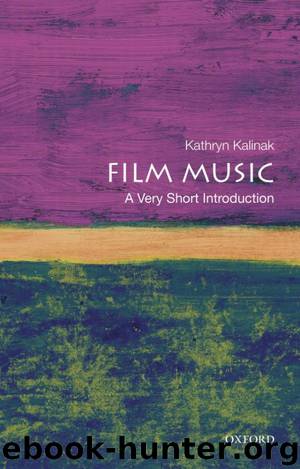Film Music: A Very Short Introduction by Kathryn Kalinak

Author:Kathryn Kalinak [Kalinak, Kathryn]
Language: eng
Format: azw3, mobi
Publisher: Oxford University Press
Published: 2010-02-24T05:00:00+00:00
5. Muir Matheson conducts William Walton’s score for Hamlet (1948). When film scores were recorded, the conductor watched the film projected on a giant screen behind the orchestra.
New musical vocabularies come to Hollywood
Romanticism began to be challenged for pride of place around mid-century when Hollywood composers began experimenting in the vocabularies of folk and jazz, the structuring model of Serialism, and the idioms of Modernism and Minimalism. While the classical Hollywood film score continued to influence the functions and placement of music, its expression was being updated. In the concert hall, composers such as Aaron Copland in Appalachian Spring, Billy the Kid, and Rodeo, and Virgil Thomson in Symphony on a Hymn Tune were forging an American musical identity from folk elements and hymnody. Both composers found their way to Hollywood, and Copland’s scores for Of Mice and Men (1940) and Our Town (1940), along with Thomson’s for the documentaries The Plow That Broke the Plains (1936), The River (1937), and Louisiana Story (1948) were highly influential. Perhaps because the western as a genre focused so intently on American values, its scores have been especially shaped by this aesthetic such as Dimitri Tiomkin’s for Red River (1948), Jerome Moross’s for The Big Country (1958), and Elmer Bernstein’s for The Magnificent Seven (1960). The prominent quotation of hymns, especially in the westerns of John Ford such as My Darling Clementine (1946) and The Searchers (1956), is another articulation of this musical aesthetic. Contemporary Hollywood films continue to rely on the harmonic textures and modal melodies of American folk song (and Copland’s influence looms large) to encode Americanness in such scores as Randy Newman’s for The Natural (1983) about the quintessentially American sport of baseball. Even a western steeped in a Modernist musical idiom (There Will Be Blood, 2007) cannot resist the inclusion of a hymn.
Like Copland and Thomson in the United States, the concert composer and conductor Silvestre Revueltas in Mexico evoked nationalism through the use of traditional music. But Revueltas put a Modernist spin on that music in Let’s Go with Pancho Villa! (1936) and The Night of the Mayas (1939). Inspired by rather than quoting from indigenous musics and folk traditions, Revueltas refracted Mexico’s distinctive folk melodies and instrumentations through Modernist techniques, finding a unique form of national musical expression. Revueltas himself can be glimpsed in Let’s Go with Pancho Villa! where he can be seen playing the piano, and heard in the Hollywood film Sin City (2005) where his tone poem for orchestra, Sensamaya, is quoted at length.
In Hollywood, jazz infiltrated the film score in the 1950s and gravitated toward film noir, crime film, and urban melodramas in scores such as Alex North’s for A Streetcar Named Desire (1951), Elmer Bernstein’s for Sweet Smell of Success (1957) featuring the Chico Hamilton Quintet, John Lewis’s for Odds Against Tomorrow (1959), featuring the Modern Jazz Quartet, and Henry Mancini’s for Touch of Evil (1958). Jazz was initially associated with urban decadence, and the extent to which these associations cling to jazz is an open question among film scholars.
Download
Film Music: A Very Short Introduction by Kathryn Kalinak.mobi
This site does not store any files on its server. We only index and link to content provided by other sites. Please contact the content providers to delete copyright contents if any and email us, we'll remove relevant links or contents immediately.
Call Me by Your Name by André Aciman(20489)
Ready Player One by Cline Ernest(14637)
How to Be a Bawse: A Guide to Conquering Life by Lilly Singh(7467)
Wiseguy by Nicholas Pileggi(5769)
The Kite Runner by Khaled Hosseini(5163)
On Writing A Memoir of the Craft by Stephen King(4927)
Audition by Ryu Murakami(4923)
The Crown by Robert Lacey(4805)
Call me by your name by Andre Aciman(4676)
Gerald's Game by Stephen King(4640)
Harry Potter and the Cursed Child: The Journey by Harry Potter Theatrical Productions(4491)
Dialogue by Robert McKee(4386)
The Perils of Being Moderately Famous by Soha Ali Khan(4214)
Dynamic Alignment Through Imagery by Eric Franklin(4208)
Apollo 8 by Jeffrey Kluger(3702)
The Inner Game of Tennis by W. Timothy Gallwey(3675)
Seriously... I'm Kidding by Ellen DeGeneres(3627)
How to be Champion: My Autobiography by Sarah Millican(3583)
Darker by E L James(3512)
